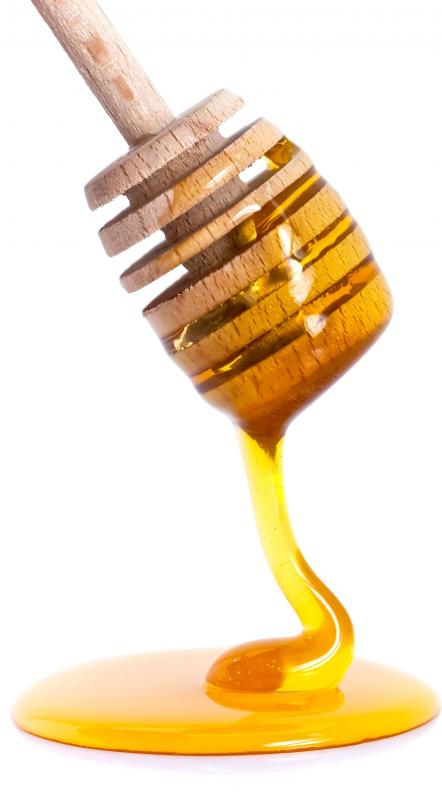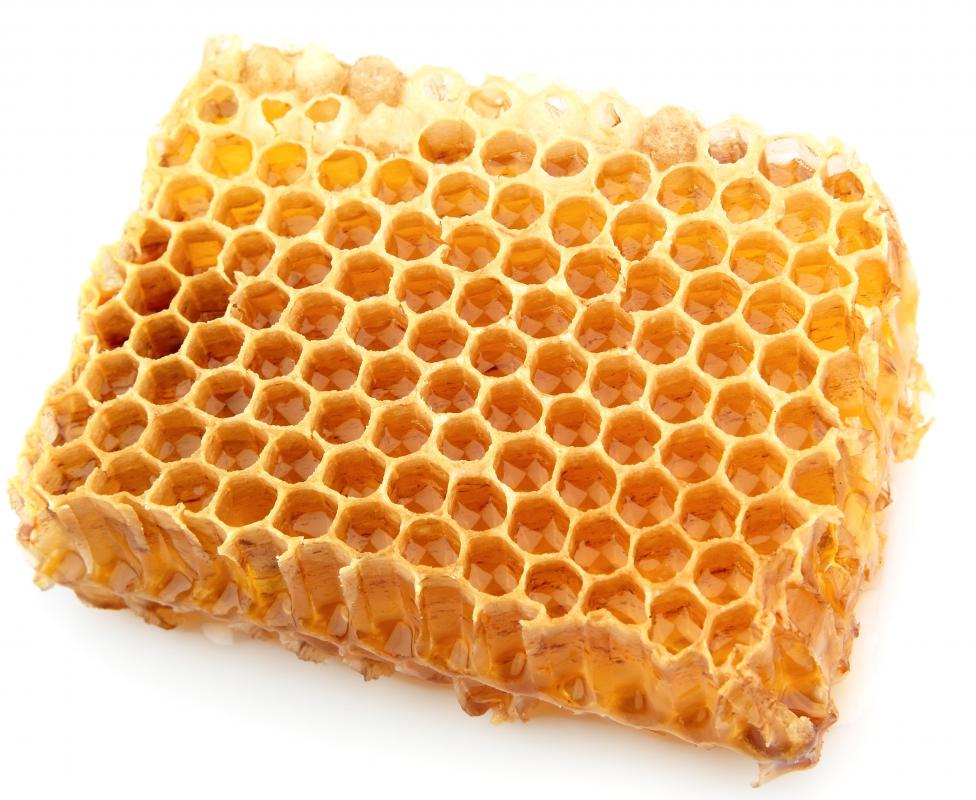At TheHealthBoard, we're committed to delivering accurate, trustworthy information. Our expert-authored content is rigorously fact-checked and sourced from credible authorities. Discover how we uphold the highest standards in providing you with reliable knowledge.
What Are the Signs of an Allergic Reaction to Honey?
An allergic reaction to honey can vary from mild to potentially life threatening, depending on the severity of the allergy. Some of the most common signs of a honey allergy include respiratory symptoms, such as coughing or wheezing, along with itchy, watery eyes or a runny nose. Skin conditions, such as eczema, or gastrointestinal disturbances, such as vomiting or diarrhea, may sometimes occur. Swelling of the face, lips, or throat may indicate a severe type of allergic reaction known as anaphylaxis and constitutes a medical emergency.
Mild to moderate respiratory disturbances are common when a person has an allergic reaction to honey. This may include typical allergy symptoms such as itchy, watery eyes, a runny nose, sneezing, nasal congestion, and headaches. Infections may develop as a result of these symptoms, or the patient may feel foggy-headed. The immune system may become weakened, especially if honey is consumed on a regular basis in spite of the allergy.

The reaction may lead to skin changes as well, and can include itching and the development of a localized or widespread rash. A raised rash that may itch and burn, known as hives, is a common allergic response. Ongoing use of honey by a person with an allergy to honey may lead to a skin condition known as eczema.
Some patients may experience a variety of gastrointestinal disturbances, including nausea, vomiting, or diarrhea as symptoms of a honey allergy. Abdominal discomfort or cramping may occur as well. Excessive diarrhea or vomiting should be reported to a medical professional, and patients should be careful not to become dehydrated. Drinking plenty of fluids is usually enough to prevent dehydration, although severe cases of diarrhea or vomiting may require IV fluids in a hospital setting.

Anaphylaxis may occur during a severe allergic reaction to honey. This can become fatal within a matter of minutes if emergency medical attention is not obtained. Symptoms of anaphylaxis may include swelling of the face, lips, or tongue, and the development of a rash that may or may not itch. Breathing may become difficult, sometimes causing the patient to lose consciousness. If anaphylaxis is suspected, emergency medical professionals should be contacted immediately, as attempting to transport the patient to the hospital via traditional means may not be fast enough.
What is Eczema, and How is It Treated?

Eczema is characterized by skin inflammation and itchiness. It presents itself in red patches or little red spots that are often swollen and itchy. When someone is experiencing an allergic reaction, it sends their body's immune responses into overdrive. This reaction is likely the cause of eczema in people who are having an allergic reaction to honey.
The body sees the chemical compounds in honey as potentially threatening and therefore releases antibodies to attack it. Unfortunately, one of the side effects of this response is inflammation. As a result, eczema may start to present itself.
Treatment for Eczema

The most common treatment for eczema is moisturizers and topical lotions. In some cases, topical corticosteroids help reduce inflammation. Bandages and other forms of skin wraps may also help aid in the healing process in issues where eczema is causing severe itching.
It is also critical to avoid any possible triggers for eczema as well. For example, tight, scratchy fabrics and scented soaps and lotions are all candidates for triggering an eczema flare-up which you should avoid.
Why are Some People Allergic to Honey While Others are Not?
People are allergic to many different things for many different reasons. Still, you may be wondering, what is it in honey that makes people allergic?
Honey allergies are common because honey is considered to be a potentially allergenic food. The fact that so many different environmental factors go into the making of honey could be why it is considered allergenic.

From the gland secretions and wax from the bees to the actual flower nectar, each step in the honey-making process comes from natural processes. These biological processes could be what causes some peoples’ bodies to reject the product that comes from it, which in this case is honey.
What Do I Do If I Have an Allergic Reaction to Honey?
Allergic reactions are severe and can be fatal if not treated promptly and efficiently. Therefore, if you or someone you know appears to be having an allergic reaction to honey, it’s essential to know what steps to take.

If the symptoms are mild to moderate, simply take an over-the-counter antihistamine such as Benadryl, and symptoms should ease up in about 15-30 minutes. If the person in question is allergic to Benadryl, find an alternative antihistamine drug such as Claritin or Xyzal.
Although Benadryl will treat the inflammation and allergic reaction symptoms, you may experience a few side effects from the drug.
Possible Side Effects From Benadryl:
- Headache
- Drowsiness
- Dizziness
- Dry Mouth
- Constipation
Suppose the symptoms of the allergic reaction to honey are more severe in nature. In that case, it is vital to seek medical attention.
If I’m Allergic to Bees, Could I Also be Allergic to Honey?
If you are allergic to bee stings, it means that your body reacts to the venom in bee stings. In this case, you’re not allergic to the bee itself but rather to the secretion from the bee when it stings you.
Although rare, someone that is allergic to bee venom could also incur a honey allergy from the condition as well, but it has not been able to be proven. A study by the European Journal of Allergy and Clinical Immunology concluded that people allergic to pollen or bee venom are not typically allergic to the honey produced by the bees.
Signs of an Allergic Reaction to Honey in Children
Signs of an allergic reaction to honey in children are similar to what an adult may experience. Therefore, it is crucial to closely monitor children under 5 when introduced to new foods, especially one considered a potentially allergenic product.
The most common signs of an allergic reaction to honey in children include:
- A runny nose
- Sneezing and coughing
- Red bumps on the skin
- Itching
- Watery eyes
Symptoms of a more severe allergic reaction may also include nausea, vomiting, diarrhea, and anaphylaxis. If your child shows any of these symptoms, seek medical attention quickly.
Also, it’s essential to remember never to give a child under 12 months old honey. This isn’t due to the allergenic nature of the food but rather a bacteria that can sometimes infect honey called Clostridium.
AS FEATURED ON:
AS FEATURED ON:
















Discussion Comments
My dad's been allergic to honey for as long as I can remember. The allergy in itself is not fatal but the symptoms can. In his case the swelling is quite severe in his mouth, especially the tongue in which case he might suffocate. This is probably all due to a bee sting allergy.
@burcinc-- People can have sensitivity and allergy to bee pollen. Raw honey is actually the worst kind of honey for people with honey allergy because it's full of bee pollen. Filtered honey that's sold in stores has less pollen and usually doesn't trigger allergies as badly.
I think the theory behind giving raw, local honey to people with seasonal pollen allergies is to help strengthen their immune system. But this is only applicable if an individual is not allergic to bee pollen found in honey. Someone with a honey allergy should never consume honey.
I can't believe honey can cause allergies. I thought that raw honey is recommended to people with pollen allergies. Am I wrong?
@anon306927-- I'm not a doctor, but in my opinion, every allergy has the potential to be fatal. There is no guarantee that a mild allergic reaction isn't going to turn into anaphylaxis next time. Allergies aren't something that can be predicted.
For example, my younger brother recently developed an allergy to honey. He ate honey his whole life without problems! Now if he has even a little bit, he gets a rash and swollen lips.
I've had some friends before who had a honey allergy but the doctor said this is something that's manageable. It's not fatal and can easily be treated especially when you take antihistamines, at least that's what I think.
Post your comments